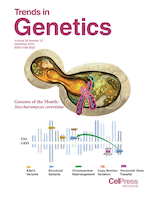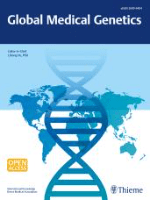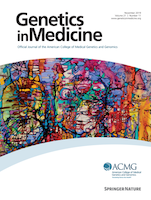
Medizinische Genetik
Scope & Guideline
Bridging Theory and Practice in Medical Genetics.
Introduction
Aims and Scopes
- Clinical Genetics and Diagnostics:
The journal emphasizes the application of genetic knowledge in clinical settings, including diagnostic methodologies, genetic testing, and the role of genetics in various diseases. - Research on Genetic Disorders:
A core focus is on understanding genetic disorders, their mechanisms, and implications for treatment and management, with attention to both rare and common genetic conditions. - Genetic Counseling and Ethical Considerations:
The journal addresses the importance of genetic counseling, exploring ethical issues, patient perspectives, and the evolving role of genetic counselors in healthcare. - Technological Advances in Genetics:
It highlights innovations in genetic technologies, including next-generation sequencing, liquid biopsies, and bioinformatics, and their impacts on research and clinical practice. - Multidisciplinary Approaches:
The journal promotes interdisciplinary research that integrates genetics with other fields such as psychiatry, oncology, and reproductive health, reflecting the multifaceted nature of genetic issues.
Trending and Emerging
- Non-invasive Prenatal Testing (NIPT):
There is an increasing emphasis on NIPT, reflecting its growing relevance in prenatal care and discussions around its implications for maternal and fetal health. - Liquid Biopsies and Cancer Genomics:
Research on liquid biopsies has surged, highlighting their potential for minimally invasive cancer diagnostics and monitoring, as well as their role in understanding tumor genetics. - Psychiatric Genomics:
The integration of genetics in psychiatry is gaining momentum, with a focus on understanding the genetic basis of psychiatric disorders and the implications for treatment. - Ethics and Policy in Genetic Testing:
Emerging discussions around the ethical implications and policy frameworks for genetic testing, particularly concerning consent and incidental findings, are increasingly prominent. - Genomic Medicine and Public Health:
The journal is placing more emphasis on the intersection of genomics and public health, particularly in areas such as newborn screening and population genetics, reflecting a broader societal impact of genetic research.
Declining or Waning
- Historical Perspectives in Genetics:
Papers focusing on the historical development of genetics and its methodologies have become less common, indicating a shift towards contemporary issues and applications. - Basic Genetic Mechanisms without Clinical Context:
There is a noticeable decline in publications centered solely on basic genetic mechanisms without direct application to clinical scenarios, as the journal increasingly prioritizes translational research. - Niche Genetic Disorders:
Research on very specific or niche genetic disorders appears to be waning, possibly as the journal focuses more on broadly impactful genetic diseases and common conditions. - Traditional Genetic Counseling Models:
As the field adapts to new technologies and methodologies, traditional models of genetic counseling are being less frequently discussed, indicating a shift towards more innovative and integrated approaches. - Stand-alone Genetic Studies:
The frequency of standalone studies focusing solely on genetic variants without linking them to clinical implications or patient outcomes has decreased, reflecting a trend towards more applied research.
Similar Journals

European Journal of Medical Genetics
Exploring the Intersection of Genetics and MedicineEuropean Journal of Medical Genetics, published by Elsevier, is a pivotal platform dedicated to advancing knowledge in the fields of medical genetics and its clinical applications. With an ISSN of 1769-7212 and an E-ISSN of 1878-0849, this journal fosters innovative research and insights into the genetic factors that influence human health. Ranked in the Q3 category for both Genetics and Clinical Genetics, and achieving notable recognition in Medicine (miscellaneous) with a Q2 positioning, it strives to bridge the gap between laboratory findings and clinical practice. Operating in an Open Access format, the journal aims at maximally disseminating essential findings to researchers, professionals, and students alike, ensuring that critical advances in genetics are accessible to the global medical community. With converged publication years spanning from 2005 to 2024, the journal strengthens its mission to be at the forefront of genetic research that informs clinical methodologies and fosters improved healthcare outcomes.

TRENDS IN GENETICS
Exploring Innovations that Transform GeneticsTRENDS IN GENETICS, published by CELL PRESS, is a leading journal in the field of genetics, recognized for its significant impact on research and advancements in the discipline. With an impressive Scopus ranking of #10 out of 347 in the category of Genetics and a 97th percentile ranking, this journal stands as a premier platform for publishing innovative, high-quality articles that shape the future of genetic research. Since its inception in 1985, TRENDS IN GENETICS has been at the forefront of the genetic sciences, continuously disseminating crucial findings while maintaining a strong commitment to scientific rigor and integrity. Although it does not currently offer open access options, its rigorous peer-review process ensures that only the most relevant and groundbreaking studies make it to publication. Scholars and practitioners in genetics will find this journal to be an invaluable resource for keeping abreast of the latest developments, trends, and methodologies that drive the field forward.

Global Medical Genetics
Exploring the Intersection of Genetics and HealthcareGlobal Medical Genetics is a premier open-access journal dedicated to advancing the field of medical genetics. Published by GEORG THIEME VERLAG KG, this journal has been providing a dynamic platform for disseminating cutting-edge research and clinical findings since its inception in 2020. With the ISSN 2699-9404, it serves as an essential resource for researchers, healthcare professionals, and students who seek to explore the complex interplay between genetics and medicine. The journal aims to foster collaboration and innovation in the genetics community, addressing a diverse range of topics from genetic disorders to the application of genomics in personalized medicine. By providing open access to its content, Global Medical Genetics enhances knowledge sharing and accelerates advancements in healthcare, making it a vital asset for anyone invested in the future of genetics.

GENETICS IN MEDICINE
Bridging Genetics and Clinical PracticeGENETICS IN MEDICINE, published by Elsevier Science Inc, stands as a premier journal in the realms of clinical genetics and medicine. With an impressive impact factor and ranked #3 out of 99 in the category of Genetics (clinical), alongside a 97th percentile ranking in the Scopus database, this journal is recognized for its outstanding contribution to the field. Established in 1998, it aims to disseminate innovative research and clinical advancements bridging genetics and medical practice, making it essential reading for researchers, healthcare professionals, and students alike. Although not an open-access journal, GENETICS IN MEDICINE provides valuable insights into genetics that drive the future of personalized medicine and patient care. With a commitment to excellence, the journal continuously explores the evolving landscape of genetic research to foster the understanding and application of genetic principles in medical contexts.

JOURNAL OF MEDICAL GENETICS
Unlocking the Secrets of Genetics for Clinical Innovation.JOURNAL OF MEDICAL GENETICS, published by the BMJ PUBLISHING GROUP, stands as a premier platform in the field of genetics, focusing on both fundamental genetic research and its clinical applications. With a distinctive legacy dating back to 1965 and a significant role in advancing the understanding of genetic disorders, this journal has established itself in the top tiers with a commendable Q1 category ranking in both Genetics and Clinical Genetics as of 2023. The journal's impact is underscored by its Scopus rankings, placing it among the leading journals in the fields of medicine and genetics. Researchers and practitioners are drawn to its rigorous peer-review process and its commitment to disseminating high-quality research findings, critical reviews, and innovative clinical practices. While it is not an open-access journal, the insights provided are invaluable for anyone looking to deepen their knowledge or contribute to the burgeoning field of medical genetics.

ANNALS OF HUMAN GENETICS
Bridging Knowledge and Practice in Human GeneticsANNALS OF HUMAN GENETICS is a distinguished peer-reviewed journal extensively covering the field of genetics, published by Wiley. Established in 1954 and extending its influence into 2024, this journal features comprehensive research articles, reviews, and case studies aimed at advancing our understanding of human genetic conditions and their implications on health. With its ISSN number 0003-4800 and E-ISSN 1469-1809, the journal has carved a prominent niche within the academic community, currently ranking in the third quartile in both genetic and clinical genetics categories (Q3, 2023). Its Scopus rankings reflect its credibility, placing it #54 out of 99 in clinical genetics. Though it is not open access, it remains an essential resource for researchers and practitioners seeking to explore the latest findings and methodologies in genetics, serving as a critical platform for knowledge dissemination and dialogue within the scientific community. As we delve deeper into the complexities of our genetic makeup, the ANNALS OF HUMAN GENETICS continues to play a vital role in fostering innovation and collaboration in this ever-evolving field.

Journal of Pediatric Genetics
Unlocking the Secrets of Genetic Influences on Child HealthJournal of Pediatric Genetics, published by GEORG THIEME VERLAG KG, is an essential resource in the field of pediatric medicine and genetics. With a focus on the genetic determinants of health and disease in children, this journal aims to advance the knowledge and application of genetic research in pediatric care. Although it has faced challenges in its indexing in recent years, it provides an important platform for practitioners and researchers dedicated to understanding the complexities of pediatric genetics. As evidenced by its position in Scopus ranks—ranked #209 in Pediatrics and #87 in Clinical Genetics—the journal serves a niche yet critical audience seeking to explore the interplay between genetic factors and childhood health outcomes. The Journal of Pediatric Genetics invites scholars and professionals to delve into its rich content, contributing to the ongoing discourse in this vital field, while the absence of open access highlights the journal’s curation of high-quality, peer-reviewed articles that are valued across academia and clinical practices.

INTERNATIONAL JOURNAL OF HUMAN GENETICS
Fostering Dialogue in the World of GeneticsINTERNATIONAL JOURNAL OF HUMAN GENETICS is a distinguished publication dedicated to advancing knowledge in the fields of genetics and molecular biology. Published by KAMLA-RAJ ENTERPRISES, this journal explores critical developments and research findings from 2008 to 2016, though its coverage in Scopus has since been discontinued. With an ISSN of 0972-3757 and an E-ISSN of 2456-6330, the journal aimed to foster scholarly dialogue and serve as a resource for researchers, professionals, and students engaged in human genetics. While the journal holds a modest ranking in categories such as Biochemistry and Genetics, it remains a vital source for exploring niche topics within the realm of human genetics. Researchers interested in genetic screening, gene therapy, and clinical genetics will find valuable insights herein. Despite its pause in indexing, the journal continues to contribute to the academic discourse by disseminating critical research that bridges gaps in understanding human genetics.

Genetic Testing and Molecular Biomarkers
Exploring the Frontiers of Genomic Medicine.Genetic Testing and Molecular Biomarkers, an esteemed journal published by MARY ANN LIEBERT, INC, serves as a pivotal platform for advancing the field of genetic research and its applications in medicine. Focused on the innovative intersections of genetics and biomarker discovery, this journal has consistently contributed meaningful insights since its inception in 2009, with its scope evolving through 2024. With an ISSN of 1945-0265 and an E-ISSN of 1945-0257, it offers both traditional and open access options to cater to a broad audience of researchers, professionals, and students. Despite its current classification in the Q4 and Q3 quartiles for Genetics (clinical) and Medicine (miscellaneous) respectively, the journal remains committed to publishing high-quality, peer-reviewed articles that push the boundaries of knowledge in the field. As the landscape of genomic medicine continues to expand, Genetic Testing and Molecular Biomarkers is positioned as a crucial resource for disseminating cutting-edge discoveries and fostering interdisciplinary collaboration.

JOURNAL OF GENETICS
Advancing the Frontiers of Genetic ResearchJOURNAL OF GENETICS, published by the Indian Academy of Sciences, is a pivotal platform for researchers and scholars in the field of genetics. With its long-standing history dating back to 1910, this journal has consistently contributed to the academic discourse through the rigorous publication of original research, reviews, and case studies. Despite its current classification in the Q4 quartile for the 2023 metrics in Genetics, the journal plays a critical role in advancing our understanding of genetic principles, experimental methodologies, and innovations. Spanning a diverse array of topics, the journal aims to foster scholarly exchange and collaboration within the global genetics community. For researchers aiming to publish their work, accessing the journal’s comprehensive archives, which include publications from as early as 1910 to the present day, offers a valuable perspective on the evolution of genetic research. As it continues to adapt to the changing landscape of scientific inquiry, JOURNAL OF GENETICS remains a significant resource for students, professionals, and academics dedicated to exploring the complexities of genetics.